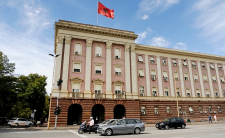Constitutional history
Albania was controlled by the Ottoman Empire for nearly four centuries starting in 1506. In response to numerous revolts, the Ottomans began to convert Albanians to Islam starting at the end of the sixteenth century. By the end of the seventeenth century, approximately two-thirds of the population was Muslim, which aggravated pre-existing religious divisions. As the Ottoman Empire began to decline, local lords gained power. After the sultan removed the feudal lords, private tribal chieftains gained control. Ottoman rule remained oppressive to the end.
In 1878, the Albanian League of Prizren was founded with the goals of unifying Albanian territories and developing Albanian language, education, culture and literature. After the fall of the Ottoman Empire, Albanians engaged in a three-year armed struggle for autonomy that culminated in the Vlora Proclamation of November 28, 1912, which declared Albania's independence.
When ambassadors of major European powers drew Albania's borders, they ignored demographics and ceded large portions of the Albanian population to Serbia and Greece. With the advent of the First World World War in 1914, Albania was plunged into chaos, with no political leadership. After the war, there were discussions during the Paris Peace Conference (1919-1920) about dividing Albania among its neighbors. Despite this, Albania survived as an independent nation. In 1920, the League of Nations admitted Albania as a member, presenting the nation with its first international recognition of its sovereign state status. Bishop Noli became prime minister in 1924 and attempted to create a Western-style democracy in Albania. However, a series of political problems led to a coup, overthrowing Noli shortly thereafter and installing King Zog, who remained in power until the Second World War.
Following World War II, Enver Hoxha seized control and led Albania into forty-five years of isolation. A Constitutional Assembly convened to write a new constitution decalred the country a “People's Republic” on January 11, 1946. A constitution adopted on March 14, 1946 provided a socialist state structure for Albania, which lasted for thirty years. On December 28, 1976 a new constitution that further centralized the state and increased collectivism was adopted. Between 1990 and 1991, the Labour Party, recognizing that the previous constitutional structure was no longer viable, began drafting laws that would introduce basic democratic institutions and protections for human rights. These laws, known as the Major Constitutional Provisions, formed the foundation for a modern democratic state.
The Major Constitutional Provisions were not without flaws as they lacked clarity and could easily be amended. To remedy these errors, a Constitutional Commission worked in 1993 and 1994 to develop and propose a draft constitution. The process was exclusive and as a consequence the Socialist party challenged the referendum in the Constitutional Court. The court did not hear the challenge before the referendum, which heightened the illegitimate appearance of the overall drafting process. The referendum resulted in a clear defeat for the proposed constitution.
In 1996, the government became instable when it failed to halt several pyramid schemes. Accused in some quarters of being actively involved in the schemes, the government finally collapsed between November 1996 and March 1997 and the country plonged into political instability. This situation created an economic downturn in which many Albanians lost most or all of their savings. Because the government reacted slowly and ineffectively, strong anti governement resistance emerged, agaisnt which the government by imposing martial law. As public outrage and chaos grew, NATO launched Operation Alba and entered the country to stabilize it.
Along with NATO troops, the Organization for Security and Cooperation in Europe (OSCE) assisted in Operation Alba. OSCE was mandated to assist in democratization and coordinate with other international organizations. After order was restored, elections were held in June and July of 1997. The Democratic Party of the current president, Sali Berisha, defeated and the Socialist Party received over 50% of the vote. Following the election, the Democratic Party took a hostile position towards the Socialist Party and rejected the election results.
Recent Constitutional Building Process
The Constitution of 1998 emerged amidst the political instability surrounding the pyramid scheme, the subsequent NATO operation, and the division between the Democratic and Socialist parties. The process for drafting the new constitution began in 1997 when the new parliament approved Decision 339, which provided the legal framework for the constitutional process. The Decision designated a twenty-one member parliamentary commission to lead the process. Although Decision 339 originally called for a referendum in early spring of 1998, November 22nd was eventually set as the referendum date in order to create a more inclusive process with full participation by all relevant actors.
The drafting process included a broad, representative body of political actors, except for the Democratic Party, which refused to participate. Under Decision 339, a Constitutional Commission was charged with producing a draft constitution for public comment. The Commission had representatives from all parties proportionate to their respective voting blocks in Parliament. Representatives from two minority parties chaired the Commission to encourage an open and inclusive approach. The resulting structure gave the Socialist Party a one-seat majority. This structure provoked a boycott from the Democratic Party, which insisted on having veto power.
Broad public participation, by both local citizens and the international community, was a major priority of Decision 339. The Administrative Center for the Coordination of Assistance and Public Participation (ACCAPP) collected and distributed information, organized polls and civic education, and provided training to practitioners. Although ACCAPP was supported by the OSCE and the Albanian government, it retained its independence and was financed largely by NGOs and foreign governments.
To ensure broad public participation, ACCAPP first held over a dozen forums and symposia for NGO representatives to discuss constitutional issues. Thus, Commission members drafting the constitution were aware of the public concerns as presented by these NGO representatives. This was a reasonable process for public input as Albania had a well-developed civil society at the time. Later, in May of 1998, the Three Powers Symposium was held. This event gave the constitution drafters an opportunity to hear from international experts on the legislative, executive and judicial powers. Members of the opposition party, individual citizens and a broad array of people participated in the symposium.
The next phase of public participation consisted of a review of the August 5th constitutional draft. In the international arena, the dominant constitutional expert consulted was the Venice Commission of the Council of Europe. However, American and European constitutional experts were also consulted frequently. Domestically, public hearings were held throughout the country. The hearings were open to everyone and aimed at soliciting comments. As a result of the boycott, there was limited participation by the opposition party. After hearing public comments, the Commission accepted fifty changes affecting over forty-five articles. The changes represented interests of a broad range of individuals and gave greater credibility to the constitution-drafting process.
Civic education was an important component of public participation in the constitution-drafting process. ACCAPP provided civic education on the proposed constitution in coordination with local NGOs, the Constitutional Commission and Albanian citizens. The educational programs included issue forums, radio programs, pamphlets, newspaper serials, constitutional papers by experts and essay writing contests. Education on constitutional issues continued through OSCE after the constitution was approved.
The constitution-drafting process, however, faced several impediments and was nearly derailed by a coup in September of 1998. Initially, the process was complicated by the challenges of educating voters and a threatened boycott by the Democratic Party. Repeated attempts to bring the Democratic Party into the process failed. Later, political tensions culminated on September 12th when Azem Hajdari, a high-level Democratic Party official, was assassinated. The Democratic Party leadership blamed the Prime Minister, Fatos Nano of the Socialist Party, and called for the dissolution of the government. Democratic Party supporters took over government buildings, destroyed property before heading towards the capital, Tirana. Once there, they stormed into the Council of Ministers, commandeered tanks and took control of state television. Strong diplomatic pressure was brought to bear on the insurgents, and OSCE started a dialogue to stabilize the situation. Nano resigned and a new leader was put in place by the ruling coalition. After this failed coup, Democratic Party agitation was a major concern in the referendum process; however, the failure of the coup also showed that the public did not support the Democratic Party's aggressive strategies.
While the referendum proceeded well under the circumstances, there were still several problems that emerged. The proposed constitution passed in the People's Assembly on October 30th, leaving only a short span of time, less than a month, for preparing the referendum. Moreover, the referendum became entangled in politics rather than focusing on the merits of the constitution, with the Democratic Party attempted to use the constitutional referendum as an opportunity to regain political clout after their failure in the 1997 elections. Furthermore, the Democratic Party's boycott raised concerns over intimidation towards voters. The Democratic Party challenged all attempts to encourage voter participation. The ruling coalition's campaign was also extremely limited, mainly focusing on correcting misrepresentations by the Democratic Party.
The Ministry of Local Government handled the administration of the referendum with assistance from OSCE and ACCAPP. The constitution was approved with almost 90% of votes cast in favor of the constitution. International observers reported approvingly of voting procedures on the referendum day. They also applauded the open and transparent drafting process that resulted in the 1998 Constitution.
The 1998 Constitution, consisting of 183 articles, establishes the basic institutions of a democratic state and provides protections for basic human rights. The government is structured as a unicameral parliamentary republic. The Legislative Branch consists of one 140-seat Assembly in which members serve four-year terms. The Executive Branch consists of a President, serving as chief of state, and a Prime Minister, serving as the head of government. The Assembly elects the President for a five-year term, and the President appoints the Prime Minister. The Judicial Branch consists of a Constitutional Court, which decides issues of constitutional relevance, and the High Court as the court of last resort for other issues. Universal suffrage begins at the age of eighteen. Overall, the 1998 Constitution exemplifies a modern, democratic constitution drafted through a predominantly open, transparent and inclusive process.
Timeline
| 1506 |
Albania falls under control of the Ottoman Empire |
| 1878 |
Albanian League of Prizen is founded |
| 1912 November 28 |
Albania declares its independence from the Ottoman Empire |
| 1946 March 14 |
A constitution is adopted that provided the structure for Albania as a “People's Republic” |
| 1976 December 28 |
A new constitution is adopted to expand and develop the socialist state |
| 1990-1991 |
The Major Constitutional Provisions are drafted and adopted to form the foundation for a modern democratic state |
| 1994 November 6 |
A proposed constitution, the result of an exclusive process, is defeated in a referendum vote |
| 1996 November |
The pyramid schemes begin to collapse |
| 1997 March 4 |
OSCE's governing body establishes OSCE presence in Albania |
| 1997 June-July |
Elections are held which result in a defeat for the Democratic Party and a victory for the Socialist Party |
| 1997 September 3 |
The new parliament passes Decision 339 |
| 1997 October 15 |
ACCAPP opens offices in Tirana |
| 1998 May |
The Three Powers Symposium is held to discuss the legislative, executive and judicial powers with international constitutional experts |
| 1998 August 5 |
The Constitutional Commission releases a proposed draft of the constitution for public comment |
| 1998 September 12 |
Azem Hajdari, Democratic Party leader, is assassinated |
| 1998 September 14 |
Democratic Party supporters launch a failed coup |
| 1998 September 30 |
The Constitutional Commission releases final draft of Constitution, which incorporates public comments |
| 1998 October 30 |
The People's Assembly approves the 1998 Constitution |
| 1998 November 22 |
A referendum is held in which Albanian citizens approve the 1998 Constitution, with almost 90% voting in favor of the Constitution |
| Branch | Hierarchy | Powers | Removal |
|---|



Share this article